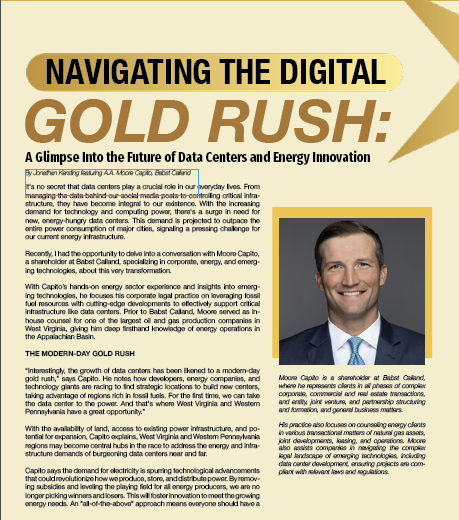A Glimpse Into the Future of Data Centers and Energy Innovation
Jonathan Kersting
 It's no secret that data centers play a crucial role in our everyday lives. From managing the data behind our social media posts to controlling critical infrastructure, they have become integral to our existence. With the increasing demand for technology and computing power, there's a surge in need for new, energy-hungry data centers. This demand is projected to outpace the entire power consumption of major cities, signaling a pressing challenge for our current energy infrastructure.
It's no secret that data centers play a crucial role in our everyday lives. From managing the data behind our social media posts to controlling critical infrastructure, they have become integral to our existence. With the increasing demand for technology and computing power, there's a surge in need for new, energy-hungry data centers. This demand is projected to outpace the entire power consumption of major cities, signaling a pressing challenge for our current energy infrastructure.
Recently, I had the opportunity to delve into a conversation with Moore Capito, a shareholder at Babst Calland, specializing in corporate, energy, and emerging technologies, about this very transformation.
With Capito’s hands-on energy sector experience and insights into emerging technologies, he focuses his corporate legal practice on leveraging fossil fuel resources with cutting-edge developments to effectively support critical infrastructure like data centers. Prior to Babst Calland, Moore served as in-house counsel for one of the largest oil and gas production companies in West Virginia, giving him deep firsthand knowledge of energy operations in the Appalachian Basin.
The Modern-Day Gold Rush
“Interestingly, the growth of data centers has been likened to a modern-day gold rush,” says Capito. He notes how developers, energy companies, and technology giants are racing to find strategic locations to build new centers, taking advantage of regions rich in fossil fuels. For the first time, we can take the data center to the power. And that's where West Virginia and Western Pennsylvania have a great opportunity.”
 With the availability of land, access to existing power infrastructure, and potential for expansion, Capito explains, West Virginia and Western Pennsylvania regions may become central hubs in the race to address the energy and infrastructure demands of burgeoning data centers near and far.
With the availability of land, access to existing power infrastructure, and potential for expansion, Capito explains, West Virginia and Western Pennsylvania regions may become central hubs in the race to address the energy and infrastructure demands of burgeoning data centers near and far.
Capito says the demand for electricity is spurring technological advancements that could revolutionize how we produce, store, and distribute power. By removing subsidies and leveling the playing field for all energy producers, we are no longer picking winners and losers. This will foster innovation to meet the growing energy needs. An "all-of-the-above" approach means everyone should have a chance to compete for this market demand. This, according to Capito, involves leveraging existing fossil fuels while renewables continue to develop and exploring nuclear energy as viable pathways to sustainability.
"With all of these demands that we have right now [for energy], we're going to see great innovation because we didn’t have the baseload needs to create and innovate and expand like we do now,” says Capito. “There's a real opportunity for any industry in that, ‘all of the above’ category to really show their chops and innovate. Because at the end of the day, we need all the energy we can get.”
Tackling Regulatory Hurdles
The expansion of data centers and evolution of energy infrastructures cannot occur in a vacuum. Capito says regulatory frameworks must evolve to keep pace with the speed of development. Addressing permitting efficiency is crucial to ensuring that new projects move forward swiftly and effectively.
“There’s a consensus that both state and federal governments need to align their regulatory processes to foster timely data center expansion,” he says. “But again, this is all going to be determined by speed. And we know that private industry and business are going to want to go to the place where they can do something the most efficiently and effectively.”
Capito notes that among the various energy solutions, nuclear energy stands out as a promising contender. Despite its historical stigma, advancements in micro and small modular reactors could offer a safe and efficient means to generate power. However, significant hurdles, particularly in the permitting and regulatory domains, need to be overcome for nuclear energy to realize its full potential, he said.
Capito’s conversation about data centers and energy infrastructure highlights not just the challenges but also the incredible opportunities that lie ahead. To capitalize on this digital gold rush, Capito says it is critical to leverage our fossil fuel advantage, harness innovation, streamline regulatory processes, and capitalize on regional strengths.
As we look to the future, one sentiment rings clear: we need energy any way we can get it.
Listen to Moore Capito's Full Interview